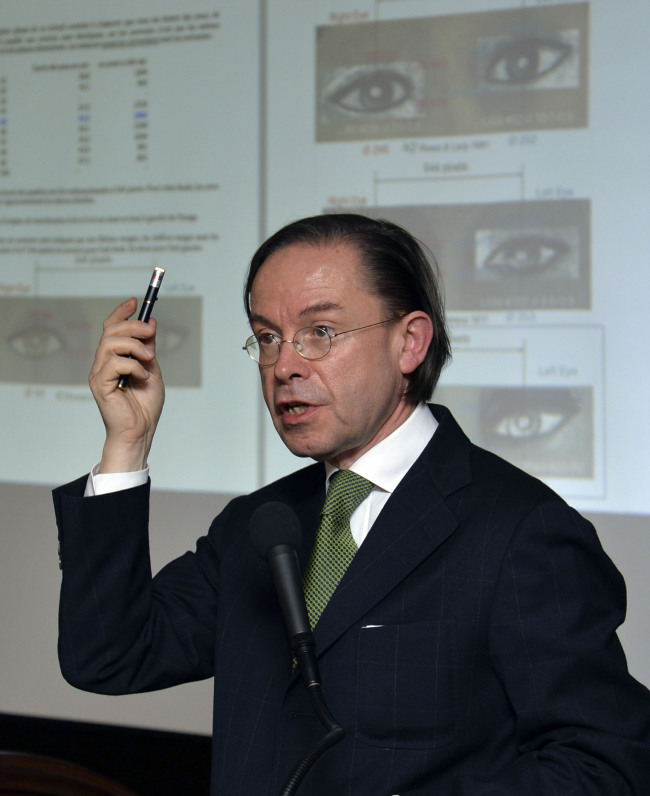The debate on whether the painting “Beautiful Woman” is a genuine work by late Korean artist Chun Kyung-ja is far from over, despite the prosecutors’ recent conclusion that the piece was Chun’s creation.
During a heated press conference in Seoul on Tuesday, Jean Penicaut, CEO of French image analysis firm Lumiere Technology, fiercely defended his firm’s conclusion that there is only a 0.0002 percent chance the piece could have been painted by Chun.
Penicaut held the press conference to rebut Korean prosecutors’ Dec. 19 announcement that the painting is a genuine work by Chun. The Seoul Central District Prosecutors’ Office, after conducting its own investigation and consulting with the country’s National Forensic Service and the Korea Advanced Institute of Science and Technology, had dismissed Lumiere’s findings.
Penicaut argued that based on a comparative analysis using Lumiere Technology’s multispectral high-definition camera -- which was invented by the company and is able to detect 1,650 different layers of a painting -- “Beautiful Woman” deviated from nine other works created by Chun from 1977 to 1985 in various aspects, including light dissemination and contrast.
 |
Jean Penicaut, CEO of French image analysis firm Lumiere Technology, explains the methods his firm employed to analyze the authenticity of “Beautiful Woman” at a press conference held at the Korea Press Center in Seoul, Tuesday. (The Korea Herald/Yoon Byung-chan) |
“The Korean prosecution said that it employed infrared rays and X-rays in its analysis,” Penicaut said at the press conference at the Korea Press Center. “These are light rays that are already included in the photographs taken by our multispectral camera, and constitute only a partial analysis.”
“The Korean prosecution has relied on outdated measures such as analysis through the naked eye,” Bae Geum-ja, from the 10-member legal team representing Chun’s surviving family, said in a statement released at the press conference. “It has not even revealed the list of experts who were involved in appraising the work.”
“We were blackmailed by the prosecutors,” said Bae at the press conference. “We were told not to rebut their conclusion, or issue any sort of press release prior to the prosecution’s announcement.”
Meanwhile, the National Museum of Modern and Contemporary Art, Korea, which holds the painting and has been staunchly defending its authenticity, said Lumiere Technology’s analysis contained “overt mistakes,” in a statement sent via email during the press conference,
The museum argued that Lumiere Technology drew its conclusion from a few details, including the tomography of the woman’s eye in the painting and the level of contrast.
“Even the nine Chun paintings used for comparison cannot be declared 100 percent genuine using Lumiere Technology’s formula,” the statement said.
MMCA further argued that although Lumiere Technology claimed to have conducted an in-depth analysis of the tomography of the painting’s layers, the analysis seemed limited only to the woman’s nose area in the painting.
Penicaut rebuffed such arguments, saying his firm had consulted with mathematics experts at various European universities to confirm the viability of Lumiere Technology’s statistics and formula.
“We did not receive any opinion that the statistics were inaccurate or irrelevant,” said Penicaut. “We would not have submitted this report if it had not been backed by objective evidence.”
The authenticity of “Beautiful Woman” has been questioned ever since it was exhibited at MMCA in 1991. Chun herself claimed in her lifetime she had “never seen the painting before” and that she had not painted it.
By Rumy Doo (
doo@heraldcorp.com)








![[Today’s K-pop] Blackpink’s Jennie, Lisa invited to Coachella as solo acts](http://res.heraldm.com/phpwas/restmb_idxmake.php?idx=644&simg=/content/image/2024/11/21/20241121050099_0.jpg)